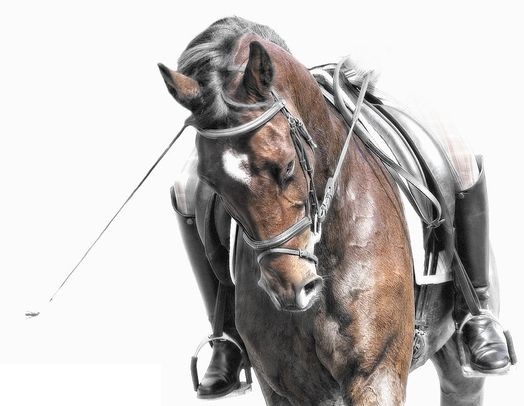Difference between revisions of "Warhorse Training (sage ability)"
Tao alexis (talk | contribs) |
|||
| (7 intermediate revisions by 2 users not shown) | |||
| Line 1: | Line 1: | ||
| + | [[File:War_horse_2.jpg|right|525px|thumb]] | ||
| + | |||
Enables the character to train worthy horses for use in combat. | Enables the character to train worthy horses for use in combat. | ||
| − | Before a horse can be trained for war, it must be judged upon its mass and its strength. Warhorses are trained from animals that have been [[Horse Breeding (sage ability)|bred for greater weight and courage]]. Of these, only 6 in 16 will be strong enough. Therefore it is important when selecting a horse for training that the horse be examined. Most warhorses were bred to be of a certain weight and strength, to ensure that good stock was available. | + | Before a [[Horse (domestic)|horse]] can be trained for war, it must be judged upon its mass and its strength. Warhorses are trained from [[Animal|animals]] that have been [[Horse Breeding (sage ability)|bred for greater weight and courage]]. Of these, only 6 in 16 will be strong enough. Therefore it is important when selecting a horse for training that the horse be examined. Most warhorses were bred to be of a certain weight and strength, to ensure that good stock was available. |
| − | Inherent in the study of training horse is the ability to make the animal manageable by characters in the midst of battle, so that the horse does not easily shy from conflict, is less likely to break when [[ | + | Inherent in the study of training horse is the ability to make the animal manageable by characters in the midst of battle, so that the horse does not easily shy from conflict, is less likely to break when [[Charging|charging]] or is otherwise able to support a combatant in full [[Armour List|armour]] with weapons. |
| − | A horse that has been trained to be a warhorse will nevertheless have a [[Morale|morale]] of 9 at the start of its association with battle. Like any other "follower," it must make its morale checks if it is injured or otherwise challenged on the battlefield. A horse with an excellent morale will be a dangerous mount when employed in charges and melee, as it is unlikely to break before the hit. | + | A horse that has been trained to be a warhorse will nevertheless have a [[Morale|morale]] of 9 at the start of its association with battle. Like any other "[[Follower|follower]]," it must make its morale checks if it is injured or otherwise challenged on the battlefield. A horse with an excellent morale will be a dangerous mount when employed in charges and melee, as it is unlikely to break before the hit. |
<br> | <br> | ||
<br> | <br> | ||
See [[Horseback Riding (sage study)|Horseback Riding]] | See [[Horseback Riding (sage study)|Horseback Riding]] | ||
| − | |||
Latest revision as of 15:07, 29 July 2022
Enables the character to train worthy horses for use in combat.
Before a horse can be trained for war, it must be judged upon its mass and its strength. Warhorses are trained from animals that have been bred for greater weight and courage. Of these, only 6 in 16 will be strong enough. Therefore it is important when selecting a horse for training that the horse be examined. Most warhorses were bred to be of a certain weight and strength, to ensure that good stock was available.
Inherent in the study of training horse is the ability to make the animal manageable by characters in the midst of battle, so that the horse does not easily shy from conflict, is less likely to break when charging or is otherwise able to support a combatant in full armour with weapons.
A horse that has been trained to be a warhorse will nevertheless have a morale of 9 at the start of its association with battle. Like any other "follower," it must make its morale checks if it is injured or otherwise challenged on the battlefield. A horse with an excellent morale will be a dangerous mount when employed in charges and melee, as it is unlikely to break before the hit.
See Horseback Riding
